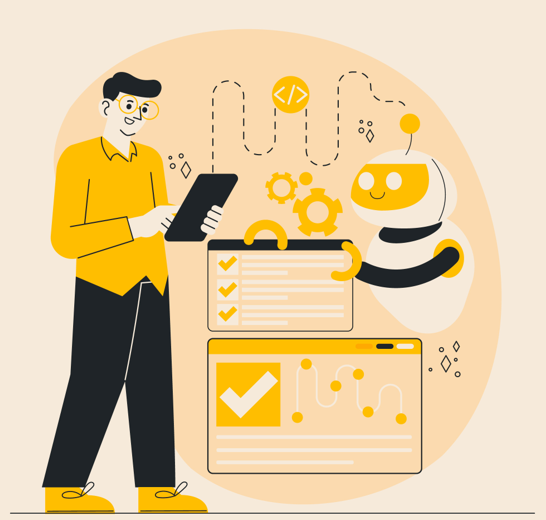Scheduling is a crucial but often tedious task for any business. Between managing employee availability, coordinating projects, and booking client appointments, schedules can quickly become complex and unwieldy without the right systems in place. This is where artificial intelligence (AI) comes in.
AI-powered scheduling tools are revolutionizing the way businesses handle their calendars. These smart assistants can streamline scheduling, optimize time management, and automate routine tasks—helping companies calendar smarter instead of harder. For today’s data-driven businesses, AI may be the productivity boost they need.
To fully realize these benefits, many companies are turning to AI/ML development services to create customized scheduling solutions that fit their unique workflows and scale seamlessly with growth.
The Challenges of Manual Scheduling
Most companies still schedule appointments the old-fashioned way – manually. This involves a mix of personal calendars, shared spreadsheets, email threads, and post-it notes. While this approach works for simple schedules, it becomes extremely problematic as a company grows.
Common pain points include:
- Double bookings and missed appointments from calendar conflicts.
- Wasted time juggling multiple availability requests back and forth.
- Lack of visibility into company-wide schedules and utilization.
- Difficulty booking appointments with clients in different time zones.
- Last-minute meeting changes and unreliable schedules.
- No central schedule for easy access and updates.
As scale and complexity rise, manual systems like these can cost companies time, money, and customer satisfaction. Employees spend countless hours on scheduling coordination rather than on mission-critical work. Appointment-driven businesses also run the risk of losing revenue from double-booked clients.
Companies need better solutions if they want scheduling that can strengthen their productivity and bottom line. AI presents an appealing option – but only if the right requirements are met.
Core Capabilities of AI Scheduling Software
AI-powered scheduling tools promise smarter support, but not all are created equal. Here are key features businesses should look for when evaluating intelligent assistants:
Availability Management
The foundation of smart scheduling is a calendar synced across the company, with employee availability visible in real time. AI platforms automatically collect availability data from connected calendars like Office 365, Google Workspace, and iCalendar. This gives a live overview of when staff members are free or busy.
As availabilities shift with new meetings or time-off requests, the schedule updates instantly. This real-time information powers smarter booking decisions across the board.
Appointment Optimization
When there is availability as input data, AI engines can get busy optimizing new appointments. Whenever a customer makes a booking request, the smart scheduler checks the calendars of staff to identify the best time. It is aimed at booking the most suitable time slot that is possible in light of employee schedules, client requirements, and business priorities.
Platforms consider such factors as the minimum time of an appointment, the time of traveling between appointments, the preparation time, and so on. These rules can be tailored to the companies such that the reservation is made according to their limitations and goals. The AI will then assess the possibilities and recommend the most convenient, sales-driven, or other objective-driven appointments.
Custom scoring algorithms can even be implemented with some tools, so that businesses can determine what they want to optimize. This will make schedules meet the needs of the company and the customer.
Automated Matching
Advanced AI scheduling systems remove the hand-written back-and-forth process of appointment scheduling. When a client has requested an appointment, the best option is automatically matched instantly depending on pre-determined criteria.
Once the best time slot is acquired, the software will have the ability to automatically send personalised calendar invites. These contain such critical information as the purchased service, delivery address, and appointment time retrieved by the connected systems such as CRM or POS. The shared calendar integration also ensures that the meeting is automatically visible in the calendar of all the employees.
This automation relieves the tiresome coordination and communication that goes into making a booking. Rather than pursuing information via lengthy email chains, AI tools do it end-to-end. This frees up teams significant time as it provides a high-quality client experience.
Smart Rescheduling
Despite best efforts, appointments inevitably need rescheduling. But coordinated calendar changes can be a nightmare, especially for large companies. AI scheduling assistants simplify this process with smart rescheduling features.
When an existing meeting needs to move, the platform analyzes current availabilities and finds an alternate time. After identifying the optimal new slot, the software facilitates rescheduling by:
- Sending reschedule notifications with a single click.
- Automatically moving the appointment across synced calendars.
- Updating any linked booking details or reminders.
Intelligent assistants reduce rescheduling to a one-click affair. This prevents wasted time coordinating calendars and chasing meeting updates.
Ongoing Calendar Optimization
The top AI platforms do not simply make appointments, but they constantly optimize the calendars even after the booking process has been made. Advanced assistants keep track of schedules in search of changes in availabilities, cancellations, and new requests.
If an opportunity to make improvements arises, such tools will automatically suggest changes in order to rebalance schedules. As an example, when a time slot is available because of a cancellation, the software may recommend rescheduling an existing suboptimal appointment to utilize the free slot.
This is an on-demand optimization that maintains team schedules running well and effectively in the long term. In contrast to such manual monitoring and updates, AI assistants perform continuous improvements in the background.
Analytics and Reporting
AI platforms unlock rich analytics into scheduling and staff utilization, transforming calendar data into business intelligence. With custom reports and insights, leaders can track metrics like:
- Appointment volume over time.
- Bookings by department, location, or service.
- Client retention and repeat booking rates.
- Individual employee productivity.
- Peak booking times and seasons.
- Scheduling effectiveness scores.
Analytics shed light on what is going on and what needs to be fixed. Businesses can then optimize scheduling processes to suit their growth strategy best. To take an example, a company could change the appointment rule or hire more people to take a higher number of same-day bookings.
Who Benefits From AI Scheduling?
Intelligent scheduling delivers game-changing advantages across sectors – from professional services to healthcare, retail, and more. The improvements span efficiency, revenue, customer experience, and bottom-line profits.
Field Service Businesses
Automated scheduling is likely to be very useful to companies that have a large number of mobile employees. Sending field techs is a huge and complicated puzzle, yet AI tools can develop optimised routes and schedules within a few seconds.
Through historical travel time, technician skills, parts/tools required, etc., platforms reduce the amount of drive time and maximize the number of appointments per day. Optimization of schedules implies doing more work without hiring more people.
Customer-Facing Businesses
Intelligent scheduling is beneficial to salons, medical clinics, automotive shops, and other customer-based businesses because it is worth the investment in terms of customer satisfaction.
AI systems are incredibly convenient because they automatically match openings with client requests. The customers will be able to schedule at any time of the day or night without the need to wait to be called back. This creates loyalty and attracts more appointments from the impulse bookers.
Automated scheduling in the back-end also avoids cases of double-bookings and miscommunications that are frustrating to customers. And since the staff will have less to do manually with the meeting requests, they will be able to focus better on providing an amazing service at the actual appointments.
Agencies and Consultancies
Professional services are all time-based and include the simple, such as legal, to the complex, such as creative agencies and businesses. The use of AI will allow maximizing the use of the most valuable asset of the company – expert time.
AI booking assistants will then schedule meetings to maximize revenue after studying individual and team availabilities. Tools can even estimate the potential billing value of a new project based on historical data and schedule optimisation to capture the most profitable work.
Global Enterprises
In the case of large companies in several regions, AI offers a scheduling command center to see the company as a whole. Intelligent platforms bring together a single picture of the organizational calendar, as opposed to hundreds of fragmented calendars.
This facilitates more intelligent cross-team meetings and coordination of remote offices. Because availabilities fluctuate in different time zones, automated assistants immediately rebalance reservations to achieve maximum efficiency.
AI Implementation Tips
The potential of AI scheduling is clear, but successful adoption requires an effective rollout. As companies evaluate and onboard intelligent tools, they should keep several best practices in mind:
Integrate Existing Systems
The most powerful AI platforms integrate directly with the calendars, CRM databases, payroll systems, and other backend technology already in use. This connectivity lets AI schedule based on real customer data and appointments already on the books rather than a siloed view. It also keeps existing systems like CRM updated automatically as meetings are scheduled.
Choose User-Friendly Software
Adoption is crucial for organization-wide scheduling coordination, so platforms should be intuitive for all staff roles. The easier the solution is to use, the faster it will become part of employee scheduling habits. Prioritize software with clean interfaces, smart automation, and easy interaction flows.
Train Scheduling Stakeholders
While AI handles the logistical heavy lifting, human guidance is still essential for business rules, optimization goals, and governance. Provide training for department heads on how scheduling criteria affect AI performance, and include them in evaluations of analytics reports. This gives key stakeholders visibility into the platform while enabling them to course-correct as needed.
Monitor and Refine
AI scheduling tools get smarter over time through analysis of real-world results and continued user feedback. Track scheduling KPIs month-over-month to catch optimization opportunities. Collect user input around their experience for platform improvements that maximize adoption. Like any technology, it takes time for AI assistants to fit an organization’s unique needs – but with the right oversight, they will.
The Future of Intelligent Scheduling
Today’s companies operate faster and more efficiently than ever before, but even the most agile organizations struggle with the familiar pain of scheduling. Juggling calendars across clients, employees, and projects consumes too many precious hours. Inefficient scheduling also creates costly business disruptions when meetings conflict or lack adequate prep time.
AI presents a better way forward. Instead of managing schedules, intelligent tools optimize them in the background so companies can focus on moving their mission forward. Already, the technology delivers impressive hands-free support across industries and use cases. And the no-code revolution is making sophisticated AI automation more accessible to organizations of any size.
As platforms continue to advance, integrating even more deeply with corporate tech stacks, their scheduling assistance will only grow more nuanced and personalized. In the coming years, companies that partner with AI to calendar smarter stand to save thousands of work hours while keeping customers happier with quick, convenient booking experiences. For once, the future of scheduling looks bright and efficient rather than frenzied.







